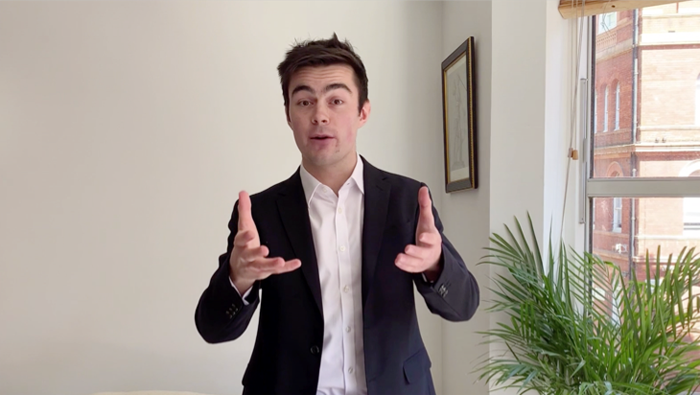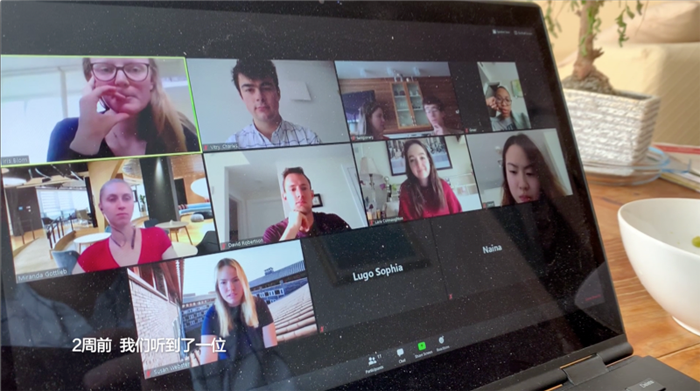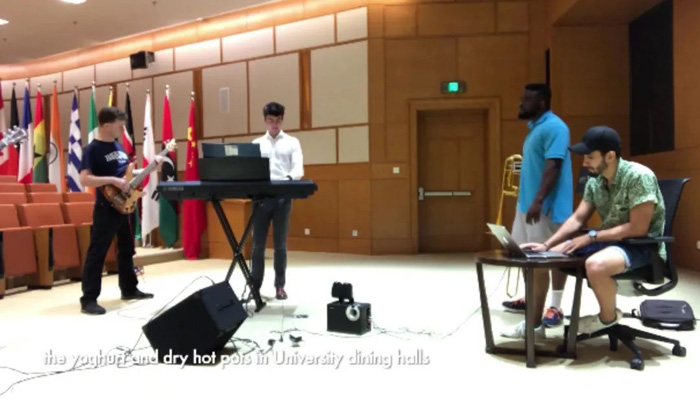4月26日,清华校友HiTC演讲大会成功举办。本届演讲大会以“没有人是一座孤岛”为主题,由清华校友总会、清华大学文化创意发展研究院与清华大学学生全球胜任力发展指导中心主办,逾10万人在线观看。
清华大学苏世民书院2018届校友Charles Vitry (卫乐善)在伦敦和大家分享了他的思考与感悟。

卫乐善演讲完整版视频(链接)
以下为演讲实录:
亲爱的清华校友以及世界各地的朋友们,我现在人在伦敦。虽然我们身隔5000英里,但我心的一部分仍扎根在清华园。我是清华大学苏世民书院2018届毕业校友代表。作为校友代表,我的工作之一就是与世界各地的校友保持联系。今天我想跟大家讲讲,苏世民校友会作为一个世界公民群体,是如何在这个特殊时期加强作用的。
一
现在,许多国家正在举国抗击新冠肺炎。新闻通常以国家视角为出发点。这一点在我们周边的社群也能感受到。清华大学苏世民书院成立短短三年以来,校友圈已经汇聚了约30个不同国家的苏世民学者。等今年夏天在校生毕业后,我们的校友将覆盖到40个国家。在校友的互动中,国家视角通常也是我们的出发点。
过去几周,一个同学重新启动了我们在清华时的一个传统。每周六,我们(通过网络)聚在一起,请一位校友在自己擅长的领域分享观点。两周前,我们听到了一位在加州圣何塞安全运营中心工作的校友分享。让我们惊讶的是,尽管所在地区拥有一些世界上最发达的城市,圣何塞还是面临着严重的医疗器械和家庭食物短缺的问题。这让我们大多数人感到很意外。

在讨论如何解决这些问题时,有的校友认为,我们不应该扰乱全球供应链的有效分配;另一些校友则认为,应当对当地情况和需求的强烈程度予以考虑。在此基础上,还有一名校友让我们考虑那些在远程会议中缺席的国家的视角,比如一些发展中国家。他们远在媒体聚光灯以外,但是应对疫情的能力远远不足。
我们认识到,想要推动建设性的变革,我们应当承认现有机制的存在,但也要诚实地看到这些机制有时并不奏效,或者不能反映一些地区的情况。在我们的讨论中,这样比较各地区视角、挑战对方观点的事情时常发生。我认为这样的讨论很重要,因为这能教会我们超越我们自己的国家视角,看到我们未曾考虑过的新维度。
二
通过分享和思考不同的国家视角,我们能关注到那些,在更深层次上将我们紧紧联系在一起的纽带:人与人之间的联结。对我们许多校友而言,最强大的联结就是我们一起游历中国的经历。攀登黄山,探索张家界,驾车穿越青海。我们敞开心扉,共同经历成长,这是如今我们许多人所怀念的。当然,我们也想念清华,想念骑着摩拜单车穿过校园,想念食堂里的清华酸奶和清芬的麻辣香锅。是这些记忆凝聚着我们。

时隔几年,在新冠疫情爆发的时刻,我们需要在同样的联结中汲取力量。我的两位同学最近召集了一次线上读诗会,让我们一起拥有了一个沉静的片刻。隔离当中,我们都需要他人的支持。那天我们读了许多诗,关于希望、悲伤、还有一些朋友们正在经历的其他感受。
分享的诗歌中有德里克·马洪的《一切都会好起来的》,正好能在这样的时刻给人以安慰。诗的结尾几句是,“我躺在灿烂的阳光里,看着天亮、云朵飞扬。一切都会好起来的。”读诗会后的几周里,我们许多人感到内心的平和,因为我们与远方的朋友以最简单的方式产生了联结。这提醒我们,尽管国际舞台上局势紧张,关注人之间的联系是十分重要的。正是这样的联结让我们成为共同栖居在这个星球的住客。
三
一旦我们认识到人之间的联结,作为全球公民一起采取行动就变得容易了。当前的新冠疫情危机就是全球迫切需要联合行动的生动例证。即使我们解决了这次危机,全球公民共同携手的需求仍在。
作为近年毕业的校友,我们和世界上许多其他毕业生一样,将在有生之年面临严重的气候变化问题。这些问题会影响所有产业、所有行业和所有国家。全球变暖的影响,如不加以遏制,将对许多族群的生计造成巨大影响。这将是全球面临的下一个挑战,而这样的挑战后面还有更多。这要求我们所有人参与解决,做出贡献。
我们校友中很多人已经意识到了。最近,一名校友前辈分享了他的观点,我十分认同。他说,全球的医护人员正在夜以继日地为保护我们冲锋陷阵。日后,我们也会有机会以同样的方式回报。通过这样的表态和其他种种事例,我看到我们的校友彼此督促着,为未来的危机承担起责任,尽管他们身处不同的行业中,走在不同的人生道路上。
最后,我想到约翰·邓恩的名句:“没有人是一座孤岛。” 我们所有人都身涉其中。这场危机教会我们超越国家的界限,关注人类共同的联结,未来,我们要作为全球公民携手共进。
英文原版
Dear fellow Tsinghua alumni, and friends across the world. Ispeak to you today from London, and although physically we are about 5000 milesaway, part of me in spirit has remained very firmly in 清华园.I serve the Tsinghua University Schwarzman Scholars graduating class of 2018 asan elected Alumni representative. It is part of our role as representatives tostay connected to our different members across the planet. I would like toshare with you today how Schwarzman Scholars Alumni have been strengthening throughthis period, as a Community of global citizens.
In these times where many countries are fighting COVID-19 intheir domestic context, national narratives are often the starting point fornews. This can also be felt in our Community. Tsinghua University SchwarzmanScholars has almost 30 different countries in its Alumni body in just 3 yearsof existence, soon to grow to 40 when the current class graduates from Tsinghuathis summer. When we engage with each other, local narratives are often the starting point.These past few weeks, one classmate has revived a tradition that used to bequite successful when we were still at Tsinghua. Every Saturday, we gather (nowvirtually) for one of our Alumni to share perspectives on a topic where he orshe has expertise.
Two weeks ago, we heard from an Alumni working in the SecurityOperations centre in San Jose, California. To our surprise, we learnt thatalthough this region includes some of the most developed cities of the world,San Jose was facing severe shortages of medical equipment and food poverty.Very few of us were expecting this. As we discussed potential solutions, someAlumni argued that we should not disrupt efficient allocation of global supplychains, with other Alumni arguing that local contexts and the severity of needshould be taken into account. Another Alumni built on this point further andasked the group to think about countries not even represented in the conferencecall, such as developing countries not in the focus of media attention but farless equipped to respond to the pandemic.
As a group, our learning was that to drive constructive change,we should recognize the existence of existing mechanisms but also be honestwhen these mechanisms aren’t working or are missing the representation ofcertain local narratives. In our Community comparing local perspectives andchallenging each other in this way happens very frequently. These are importantdiscussions because they teach us to step out of our national narratives to seenew perspectives we may not have considered.
Secondly, with different national perspectives shared andconsidered, we can then focus on what ties us together more deeply: the bondsbetween us as humans. For many of our Alumni,some of the strongest bondsbetween us are our common experiences traveling together throughout China.Climbing up ⻩山, exploring张家界 and driving through deserted plains around ⻘海. We sharedmoments of vulnerability and growth, and now many of us miss those moments. Andof course we miss Tsinghua, riding around on Mobikes through the 校园,the yoghurt (清华酸奶) and dry hot pots (清芬的麻辣⾹锅) in University dininghalls. These are memories which unite us as a Community.
Now, a couple years later, in the times of the COVID-19outbreak Alumni rely on those same human ties to find energy again. Two of myclassmates recently convened a virtual poetry night for us to recollect in acalm moment together. In these times of isolation, it’s natural for us all toneed support from others. Many different poems were read, about hope, sadnessand other feelings our friends were experiencing.
One of the poems shared was Derek Mahon’s Everything is goingto be all right, which I think brings good comfort in these times. This is howit finishes: ‘I lie here in a riot of sunlight watching the day break and theclouds flying. Everything is going to be all right.’ Many of us left thesession feeling most at peace in many weeks, having connected in a very simpleway with friends from afar. What this reminded us is that when tensions arealive in the international scene, it’s very important to focus on our humanties, making us inhabitants of the same planet that is our home.
Last, once we recognize those human ties, it becomes easier towork together as a community of global citizens. The current COVID-19 crisis isan illustration of the pressing need for joint action as a global community.But once this crisis is resolved, the need for joint action of global citizenswill not lessen.
As recent Alumni, we and many other recent graduates around theworld will be faced in our lifetimes with major climate-change related issuesimpacting all industries, all sectors, all countries. The effects of globalwarming, if not mitigated, will have signifiant consequences on the livelihoodsof many populations. That will be the next challenge we will need to face as aglobal community, the next crisis and perhaps many other crises after that. Itwill require solutions and contributions from us all.
Many in our Community realize this. A point made recently byone of our Senior Alumni really resonated with me. He shared that whilst nursesand doctors around the world continue fighting for all of us on the‘frontlines’ day on day, night on night, there will be opportunities to do goodin the future in the same way that people are doing good now. Through thisstatement and others, I am seeing our Alumni pushing each other to stayaccountable in future as they grow in different careers and paths, to mitigatethe impact of crises to come.
To finish, we can recall what John Donne’s rightly wrote:'Noman is an island.' And we are all involved in mankind. Through this crisis wecan learn to engage beyond national narratives, focus on our human ties andwork together moving forwards as a community of global citizens.
————————————————————
HiTC(Humanity in Technology and Creativity ,即科技与创意中的人文),是一种新形态的主题演讲大会,由清华文创校友发起于2017年,以“科技与创意中的人文”视角,传递清华人对世界的态度:这是一种拒绝冷漠的态度,是温暖的态度;一种拒绝浮躁的态度,是安静的态度;一种拒绝软弱的态度,是坚定的态度。